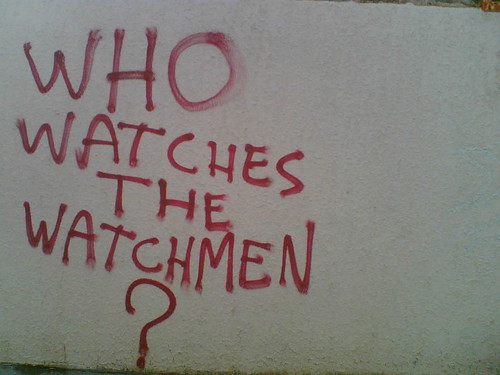I am in Chicago learning at the footsteps at the true master of modern day cross examination Terence MacCarthy. If you go into a courtroom to argue your case, his book is a must. If you can catch him at a presentation it is even better. Here in Chicago, I am lucky to be in a two and half day small group intensive workshop with him as the only instructor. I tell you this as one of Terry’s favorite words is “verisimilitude.” It is a great word whose definition is best stated as “having the appearance or semblance of truth.” It got me to thinking more about the word and the subject as applied to forensic science.
My thoughts next turned to Mr. Tomaracco who was my Jesuit high school Latin teacher. One of his favorite phrases was:
Quis custodiet ipsos custodes?
If you are not up on your Latin, it is literally translated as: “Who will guard the guards themselves?”
The phrase is traditionally attributed to the Roman poet Juvenal from his Satires (Satire VI, lines 347–8). It has been reduced in modern day to simply: “Who watches the watchmen?”

- A great question
In forensic science our current system historically can be considered a failure. It has lead to the introduction of junk science such as lead bullet analysis and other techniques that continue to cling on to life in the courtroom despite the fact that they are not validated and are not scientifically based. If we are careful and listen to the testimony, we can usual ferret these out these dangerous methods as they are characterized by one of the most dangerous phrases known and uttered in the courtroom today: “Based upon my training, knowledge, and experience (insert some opinion that is presented as an absolute truth without qualification).”
What we as a society have achieved in the courtroom can be best characterized as verisimilitude.
Whose fault is it?
Probably everyone. Judges, appellate courts, “forensic scientists,” prosecutors, jurors, and especially my brethren and sistren-the criminal defense lawyer. Who is most at blame is perhaps academic, but as a system we, meaning those who most interact with the criminal justice system, have clearly failed. We cannot be trusted, as history shows, to be the watchmen.
Maybe it’s time that we make a national forensic science ombudsman? Some independent agency whose charter it is to receive complaints, and investigate forensic science related issues. I realize that funding is a large issue in this current economic time, but even having a relatively small office could help promote better science as agencies and those doing testing and providing testimony would never know when the ombudsman’s office might turn its eye in their general direction.
Just a thought. What do you think?


